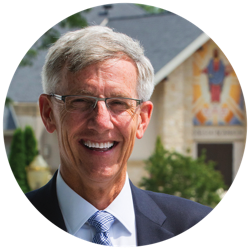All the world’s a stage, and all the men and women are merely players. They have their exits and their entrances, and one man in his time plays many parts. His acts begin seven ages.
Perhaps you recognize this poem from a play entitled, “As you like it?” Shakespeare speaks to how the drama of our lives plays out before the world—our own stage. The “seven ages” offers a framework for the drama of your life.
Act 1: the first seven years (first age) are the years of an infant.
Act 2: the second seven years (second age) are those of your early childhood.
Act 3: the third of seven years (third age) of life: early youth (ages 15-21). This is where I would like to focus us for a moment.
This is the time in your life when you are thinking about your future in terms of your 3 C’s: the Choices you will make with regard to your future Commitments and Contributions. Regardless of how or where you spend the days of your third of seven ages, you will wrestle with large questions that will impact your journey and define the purpose of your life. As you reflect on the 3 Cs, it is helpful if your environment is ready to support, encourage, and assist in that endeavor. Higher education provides you that environment.
As you ponder the many choices for college, it is fair to say there are two competing approaches to acquiring knowledge: focus the college years in a particular area or to examine knowledge across a broad range of academic disciplines. Today, many colleges or universities will tailor your studies early on under the assumption that you only need to gain the knowledge needed for specialization, such as accounting, or marketing, or electric engineering. Catholic higher education opposes that premise and advocates for offering you exposure to a wider range of disciplines and topics. You can “major” in an academic field without sacrificing the opportunity to simultaneously learn about many other disciplines is the underlying assumption. This approach is supported by the 2,000 year-old Catholic Intellectual Tradition that shows the inter-connectedness to knowledge.
Historically, Catholic higher education has championed the notion that at its core is the intention to “cultivate the intellect” of the students even as providing them preparation for the professions. Unlike a secular university or college that often views these as two separate tasks, a Catholic college or university will treat them each as necessary parts of the whole.
Some will defend the idea that the study of a particular discipline is the primary, if not only, way to prepare you for future employment or further study in the particular field. A Catholic college or university would argue, alternatively, that an “educated person is one who is free from a narrowness of interest;” thus, exposing the students to a wide variety of knowledge is the preparation necessary because your intellectual development benefits from both the study of a range of fields as well as specialization in a chosen discipline. In fact, there are many studies readily available that support the idea that an individual educated broadly is often better prepared for any future challenge than students that have limited understanding of knowledge beyond a particular discipline.
To use a sports analogy: to become a Super Bowl champion should you only focus on the specific contribution of your position? A kicker only on kicking … a lineman only on blocking? Or, should all the players have skills in the fundamentals of football, such as blocking, running, and tackling even while “specializing” (or “majoring”) at the position they are playing on the team? Is it safe to assume that a player will never find a future need for any other skill except those of their primary position positions? Of course not. Think for a moment about that kicker that ends up tackling the player returning the kick off. A championship football team is comprised of champions who have exceptional athletic ability in a variety of areas that all support the team. Catholic higher education supports students in all aspects of their studies because it is well known that the other stages of your life yet to come are never in a single dimension; thus, the idea that we should only spend these undergraduate years on a narrow set of interests is less than optimum for providing you with the tools you will really need for life.
If you spend a portion of Act 3 of your life at a Catholic college or university, then you will find academic programs and activities that are geared to broadly equip you for the future by offering you insights into a variety of academic disciplines as you move through this very specific moment of your life’s journey.
The college selection is a big decision. As you consider each school, examine how the programs offered will help you with your future choices, commitments, and contributions to your family, in your working career, and for service to your community.
This third of seven ages, Act 3, is the time to reinforce the foundation that will sustain you as you live out the drama of your life on the world stage.
Choose wisely.

